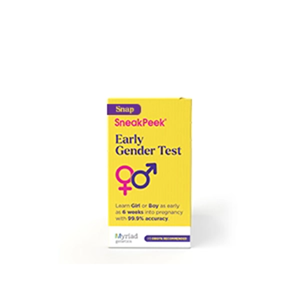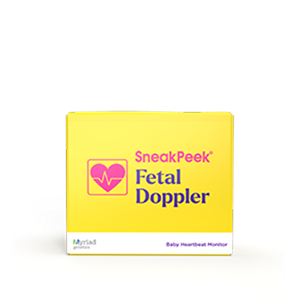Published on March 16th, 2022 and Updated on January 15th, 2024
Check out SneakPeek Gender Test to find out your baby’s gender as early as 6 weeks at over 99% accuracy1!
Which comes first: the chicken or the egg? If you’re asking philosophically, we could debate for hours. But if you’re asking about introducing them into your baby’s diet, we’ve got an easy answer for you: both eggs and chicken can be introduced to your little chick as soon as she’s ready for solid foods, around 6 months old.
In fact, eggs are one of the best first solid foods for your baby to try because they’re chock full of protein and nutrients.
Before you break out the omelet pan, there are a few words of caution about feeding your baby eggs, including choking hazards and allergy concerns. In this guide, we’ll discuss these considerations, explore the benefits of eggs, and provide some advice on when to serve different egg-based recipes to your little duckling. Additionally, if you’re interested in learning the answers to “when babies can have yogurt?” or “when can babies have water?” we’ve written about these topics in detail as well.
Let’s get crackin’!
Extraordinary Eggs
Before getting into when can babies eat eggs, let’s discuss why they’re an excellent (or should we say egg-cellent) first food.
Nutritional Benefits of Eggs
Poultry eggs are a powerhouse source of nutrients for babies, kids, teens, and adults. They contain a veritable farmyard of essential nutrients, including:
- Protein – Essential for your baby’s physical growth and development, protein is likely the first nutritional benefit most people associate with eggs. That’s because eggs are jammed-packed with protein; an average commercial chicken egg contains about 6 grams of quality protein and only 70 calories. Unlike some other sources of protein—particularly nuts, whole wheat bread, legumes, and vegetables—the protein found in eggs encompasses the complete amino acid profile. This means that all nine of the amino acids that the human body cannot produce are present in eggs, so eggs don’t have to be combined with other protein sources. In fact, due to their high quality, eggs are often the marker by which other high-protein foods are measured.
- Fat – When it comes to food, the word fat can often have negative connotations and lead some people to avoid eggs. However, healthy fats are an essential component of a well-rounded diet. For babies, in particular, healthy fats play an important role in brain development, making eggs a must-have for your little learner.
- Choline – An essential nutrient for brain growth and repair, choline is often deficient in the typical American diet. However, a single egg contains around 110 mg of choline. Beef liver is another great source of choline, but we have a feeling your baby might enjoy eggs a little bit more.
- Other vitamins and nutrients – Beyond protein, fat, and choline, eggs are a great source of the following:
- Lutein and Zeaxanthin – Antioxidants essential for eye health
- Vitamin B-12 – A key player in cellular metabolism
- Vitamin B2 – Crucial for cellular growth and development
- Vitamin B5 – Essential in red blood cell production
- Vitamin A – Key for vision, growth, and immunity
- Selenium – A mineral that supports metabolism and thyroid function
- Iodine – Another important mineral for thyroid function
- Folate – Essential for healthy cell division
- Iron – Crucial for cell function, immunity, and body temperature regulation
Accessibility and Cost of Eggs
Not only are eggs an excellent source of nutrition for your growing baby, they’re also affordable and widely available. Everywhere from your local farmer’s market to your chain drugstore is likely to have plenty of eggs in stock at any given time. What may differ between these eggs, however, are the labels they boast.
In your grocery shopping outings, you’ve likely come across a variety of egg labels. Common labels on egg packaging can include:
- Certified Organic – The only label with a definition set by the US government, certified organic eggs come from uncaged hens who are free to roam, have access to the outdoors, and are fed a diet free from conventional fertilizers and pesticides.
- Free Range – Although this label makes it sound like your egg-laying hens were exploring a wide-open prairie, this label only assures you that they had some sort of access to the outdoors (even if they never went out).
- Vegetarian-Fed – This label means that your egg-layers didn’t consume animals or animal by-products. However, keep in mind that in nature, chickens are omnivorous, eating bugs and grubs and pretty much whatever is around.
- Hormone- or Antibiotic-Free – This label is pure marketing since the Food and Drug Administration (FDA) prohibits hormones and steroids in animal farming anyway (aside from sheep and cattle farming). Plus, chickens who are administered antibiotics are generally not used for human consumption.
Understanding these different labels can help you choose the right egg to feed your baby. While none of these options necessarily produces a better quality egg, purchasing certified organic eggs can help limit your baby’s exposure to conventional fertilizers and pesticides.
Are there risks to babies eating eggs?
Although eggs are healthy, economic, and readily available, there are two risks to be aware of before embarking on a yolky adventure with your little one: choking and allergic reactions.
Choking
Eggs are no different from any other first food in that they should only be served when your baby is developmentally ready, which reduces the risk of choking. What does developmentally ready mean?
While 6 months is the general marker for introducing solid foods to babies, every baby develops at a slightly different pace. To ensure your 6-month-old is ready for solids, make sure the following skills are mastered:
- Sitting upright without assistance
- Good head and neck control
- Showing interest in solid food by reaching for it or watching others eat
- Ability to grasp small objects
Another way to reduce the risk of choking is to make sure you’re serving eggs in small, baby bite-sized pieces (we’ll get into the specifics of baby egg preparation soon). Although choking is not as common with eggs as it is with other foods—like grapes and hot dogs—it’s still important to pay attention to your child while he eats to ensure his safety (as well as to snap a few cute pics of his first egg-venture).
Egg Allergies
It was only recently that pediatricians began recommending eggs as an early solid food for babies. Long thought to be associated with allergic reactions, eggs were not traditionally recommended until after a baby’s first or even second birthday. However, due to a new flurry of associated research, the medical thinking about babies and egg allergies has changed.
Studies show that the continual and early introduction of eggs can actually help reduce the risk of a child developing an egg allergy later in life.
However, this doesn’t mean you shouldn’t take the risk of food allergy reactions seriously. As with all new foods, keep an eye out for the following reactions:
- Hives or itchy skin
- Watering eyes
- Nasal congestion or runny nose
- Sneezing
- Vomiting or diarrhea
- Difficulty breathing
If you notice any of these reactions after serving your baby eggs for the first time, contact your pediatrician right away.
How do you prepare eggs for babies?
Once you’ve decided to introduce your little one to eggs, you might wonder, how do I serve them? Scrambled? Hardboiled? Sunny-side up with a strip of bacon as a smile?
The way you should prepare eggs for your baby depends on her age and development. Let’s explore some egg-citing serving options below.
- From 6–9 Months – At this stage, your baby’s eggs should be more mush than meal. To achieve this, eggs should be fully cooked (reaching an internal temperature of 160℉) and blended to a smooth consistency. You can also thin your eggs with water, milk, or breastmilk. Avoid adding any new food or drink item to your eggs when serving them for the first time. This way, if an allergic reaction does occur, you’ll know it’s from the eggs and not from another novel ingredient.
- From 9–12 Months – Your baby is likely ready for a bit more texture and substance at this stage. That means you can toss the blender (or rather, set it to the side). Instead, try serving your baby simple scrambled eggs broken up into small bites.
- After 12 Months – By their first birthday, many babies are ready to try firmer and more complex or multi-ingredient egg dishes. This includes omelets made with veggies or cheese, chopped hard-boiled eggs mixed with herbs, and simple frittatas with soft potatoes and seasonings. Talk about a glow-up.
Tip: don’t egg-nore the yolk! The yolk is where most of the egg’s good stuff is kept, storing the prime minerals and nutrients you won’t want your baby to miss out on. Use the entire egg, keeping the yolk with the egg white, as nature intended! If you’re a fan of the runny egg yolk, it’s important to hold off on introducing them to your baby until they are at least 5 years old, as children under the age of 5 have a higher chance of Salmonella food poisoning. Stick to the scrambled egg or hard-boiled egg for peace of mind, and always serve a fully-cooked egg.
Introducing eggs to your baby’s diet from the age of 6 months can be a nutritionally beneficial and cost-effective way to ensure they get essential nutrients for their growth and development. While it’s important to remember to prepare eggs in an age-appropriate and safe manner, taking into consideration the potential for choking and allergies, eggs are an ideal food choice for a healthy, developing baby.
Sources:
- Charlotte Stirling Reed: The Baby and Child Nutritionist. The Importance of Protein for Children’s Growth.
- https://www.srnutrition.co.uk/2020/07/the-importance-of-protein-for-childrens-growth/#:~:text=Children%20need%20nutrient%20dense%20foods,needed%20for%20your%20child’s%20health.
- Nutrients. The Golden Egg: Nutritional Value, Bioactivities, and Emerging Benefits for Human Health. https://www.ncbi.nlm.nih.gov/pmc/articles/PMC6470839/
- Mayo Clinic. Eggs: Are they good or bad for my cholesterol? https://www.mayoclinic.org/diseases-conditions/high-blood-cholesterol/expert-answers/cholesterol/faq-20058468
- National Institutes of Health. Choline. https://ods.od.nih.gov/factsheets/Choline-HealthProfessional/#:~:text=The%20body%20needs%20choline%20to,phospholipids%20vital%20for%20cell%20membranes.&text=In%20addition%2C%20choline%20is%20needed,functions%20%5B1%2D3%5D.
- Time Magazine. Are Eggs Healthy? Here’s What Experts Say. https://time.com/5469246/eggs-nutrition-healthy/
- The Humane Society of The United States. How to Decipher Egg Carton Labels. https://www.humanesociety.org/resources/how-decipher-egg-carton-labels
- United States Department of Agriculture. Eggstra! Eggstra! Learn All About Them. https://www.usda.gov/media/blog/2012/04/06/eggstra-eggstra-learn-all-about-them#:~:text=Organic%3A%20Eggs%20marked%20with%20the,without%20conventional%20pesticides%20or%20fertilizers.
- Centers for Disease Control. When, What, and How to Introduce Solid Food. https://www.cdc.gov/nutrition/infantandtoddlernutrition/foods-and-drinks/when-to-introduce-solid-foods.html#:~:text=Your%20child%20can%20begin%20eating,yogurts%20and%20cheeses%2C%20and%20more.
- Cleveland Clinic. When Can I Give Eggs To My Baby? https://health.clevelandclinic.org/when-is-it-safe-to-give-eggs-to-my-baby/#:~:text=A%3A%20It’s%20best%20to%20start,the%20development%20of%20food%20allergies.
- New England Journal of Medicine. Randomized Trial of Introduction of Allergenic Foods in Breast-Fed Infants. https://pubmed.ncbi.nlm.nih.gov/26943128/
- Mayo Clinic. Egg Allergy. https://www.mayoclinic.org/diseases-conditions/egg-allergy/symptoms-causes/syc-20372115
- Kids Health. Fats. https://kidshealth.org/en/parents/fat.html
- Healthline. 6 Reasons Why Eggs Are the Healthiest Food on the Planet. https://www.healthline.com/nutrition/6-reasons-why-eggs-are-the-healthiest-food-on-the-planet#TOC_TITLE_HDR_5

Shop Our Products
SneakPeek aims to provide the most accurate and up-to-date information to help our readers make informed decisions regarding their health before, during, and after pregnancy. This article was written based upon trusted scientific research studies and/or articles. Credible information sources for this article are cited and hyperlinked.





